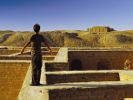Eye For Film >> Movies >> Son Of Babylon (2009) Film Review
Writer/director Mohamed Al-Daradji is a man on a mission, with all of his feature films to date concentrating on aspects of Iraq that other filmmakers have, arguably, ignored. His viewpoint is fiercely humanistic and he makes a point of shining the spotlight on the local populace in a way films such as The Hurt Locker, The Valley Of Elah or Redacted fail to do. The characters in his debut Ahlaam were fully rounded and compelling as they reflected the trauma experienced by many Iraqis immediately after the fall of Saddam Hussein, while its sister film War, Love, God & Madness, showed just how much danger the film crew - and by extension, those living in the city - were in, during the period when it was shot.
His latest film continues to draw on the horrific factual reality for many in Iraq to examine, through fiction, what happened in the aftermath of Hussein's removal - this time taking a long, hard look at the dictator's bloody legacy and, in particular, his genocidal Anfal extermination of thousands of Kurds. It is worth noting that it is estimated that during the past 40 years more than 1.5 million people have 'disappeared' in Iraq. Since the fall of Saddam, some 300 mass graves have been found, containing hundreds of thousands of bodies - an overwhelming number that makes identifying the remains particularly difficult (For more information about Human Film's campain concerning Iraq's Missing visit www.iraqsmissing.org).

Al-Daradji takes us back to 2003, when the international occupation is firmly underway and the news breaks that some prisoners of war have been liberated in the south of the country. Hearing this, a stoic Kurdish woman (Shehzad Hussein) gathers some belongings together, takes her grandson Ahmed (Yasser Taleeb) by the hand and sets out on the arduous journey across Iraq to try to discover what happened to her long-vanished son, Ahmed's father.
Al-Daradji has a measured approach to filmmaking, with an emphasis on character, so that we are really able to get to know and empathise with the grandmother and child over the course of their road trip. By choosing two characters from different generations, he is able to both consider the suffering and endurance of the past, as embodied by the grandmother, while finding a free-spirited hopefulness in the naivety and natural exuberance of young Ahmed, for whom even the idea of a father is, all too sadly, a difficult and unfamiliar concept to grasp.
By making this a road trip film, he is also able to give us a snapshot of his homeland - with some achingly good cinematography - as it was then, in turmoil, showing both the positive and negative aspects of humanity that arise from a country in chaos.
The road trip device may be a familiar one but it is a choice that broadens the appeal and accessibility of the film and takes it away from more political machinations into the realm of simpler storytelling. Al-Daradji tends to use non-professional actors in his films and it pays off remarkably here, as both Hussein and Taleeb bring a rawness of emotion to their roles that would be hard to manufacture. Hussein, in particular, is clearly able to draw on her own experiences regarding this particular subject (she lost her own family during the Anfal), to bring a heartrending quality to her character's quiet determination.
Although dealing with a difficult subject and certainly not pulling its punches or romanticising the grandmother's ordeal, this is not an angry or hysterical film. Al-Daradji is more interested in themes of reconcilliation and forgiveness, those sparks of humanity that, if we're all honest, we hope will illuminate even the darkest moments. Fully deserving of being seen outside of the festival circuit, catch it if you can.
Reviewed on: 25 May 2010

















